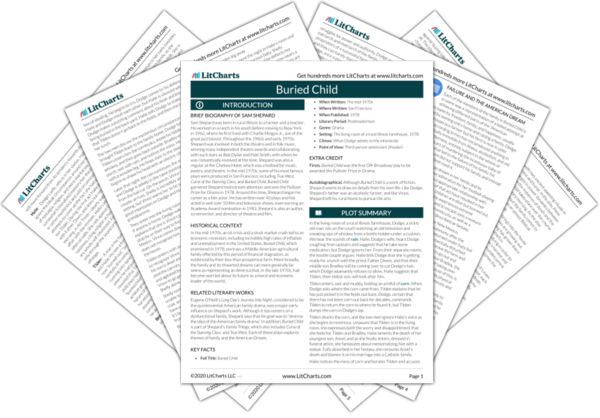Family and Its Demise
At its core, Buried Child tells the story of the breakdown of a traditional, twentieth-century family unit. During the play, Shelly, the girlfriend of one of the characters and therefore an outsider to the family, compares the family farmhouse to a Norman Rockwell painting. Her first impression, then, is of a perfect, idyllic family living a perfect life. But Shepard’s goal in establishing such a “picture-perfect” family is to immediately and obviously subvert it…
read analysis of Family and Its DemiseFailure and the American Dream
Each of the members of the family in Buried Child is in some way a representation of a failed attempt at achieving different parts of the “American Dream”—prosperity, freedom, family, and happiness, usually represented by owning one’s home and raising a family. Dodge was once a prosperous farmer but his farm is now in utter disrepair, and according to him has not produced anything in years. Now basically immobile from illness, alcoholism, and old age…
read analysis of Failure and the American DreamThe Presence of the Past
The family’s history weighs on the present world of the play like a curse. The characters in Buried Child constantly reminisce about the past and provide differing accounts of past events, as they seemingly revise their histories in order to cope with the present bleakness that they live in.
From the outset the audience is trained to think twice before believing any of the characters’ stories. In the first moments of the play, Halie recounts…
read analysis of The Presence of the Past
Rituals
Shepard plays with two ancient opposing rituals in Buried Child: harvest and burial. In the play, these rituals reflect changes in power dynamics between the characters, and foreshadow the instances of death and the possibilities for rebirth. Buried Child takes place over the course of a rainy day and into the next sunny morning. As the play progresses and new information about the family comes to light, the torrential rain can be seen as…
read analysis of RitualsReligion
Shepard only portrays religion in a negative light in the play, but the kind of religiosity the characters illustrate is more about hypocrisy and self-righteousness than genuine belief. This kind of shallow religion is then presented as an entirely inadequate coping strategy for dealing with the grief and shame that befalls the family. During the last day of his life, Dodge slowly begins to give up on suppressing the guilt he feels for his sinful…
read analysis of Religion






